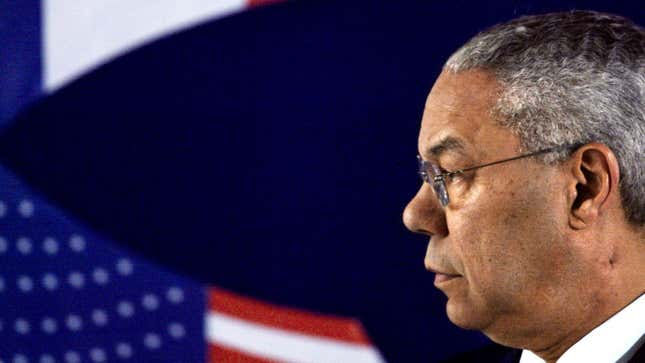
Colin Powell, the retired four-star general who was the first African American to serve as Secretary of State, died from COVID-related complications on Monday. He was 84 years old.
“We have lost a remarkable and loving husband, father, grandfather, grandfather and a great American,” said Gen. Powell’s family in a brief statement, noting that he was fully vaccinated.
Powell once said, “A dream doesn’t become reality through magic. It takes sweat, determination and hard work.” That mantra carried the distinguished statesman from his humble beginnings in New York’s South Bronx all the way to the halls of the White House. Throughout his life, the dedicated public servant never stopped fighting for the most vulnerable among us because, as he told graduates at Rice University in 2015, “We can’t sit around waiting for Superman or Superwoman to come save the day.”
Colin Luther Powell was born April 5, 1937, in Harlem. The son of Jamaican immigrants Maud and Luther Powell, the future diplomat grew up in the South Bronx in a predominately Jewish neighborhood. While he left the borough after graduating from Morris High School in 1954, Powell’s humble beginnings had an indelible impact on his life. “I left the Bronx some 55 years ago, but the Bronx never left me,” Powell said during the dedication of an apartment complex named after him in 2010.
After graduating from high school, Powell attended City College of New York, where he studied geology. Though he was an admittedly average student, Powell said he “found himself” when he joined the Reserve Officers’ Training Corps.
“It was only once I was in college, about six months into college when I found something that I liked, and that was ROTC, Reserve Officers’ Training Corps in the military. And I not only liked it, but I was pretty good at it,” he recalled. “That’s what you really have to look for in life, something that you like, and something that you think you’re pretty good at. And if you can put those two things together, then you’re on the right track, and just drive on.”
Powell excelled in the ROTC, joining the Pershing Rifles, a military-based fraternal organization and drill team started by Gen. John Pershing. In the summer of 1957, Powell headed to Fort Bragg in North Carolina. While there, he encountered segregation for the first time, but he didn’t let it deter him from service.
When he graduated from CCNY in 1958, Powell received a commission as an Army second lieutenant. After completing basic training at Fort Benning in Georgia, Powell was assigned to the 48th Infantry, in West Germany, as a platoon leader. In 1962, while stationed at Fort Devens, Mass., Powell met and married Alma Vivian Johnson, a Fisk University graduate. Later that year, he was sent to Vietnam, where he’d receive a Purple Heart and Bronze Star during his first tour of duty.
During his second tour in Vietnam, this time as a major, Powell investigated the My Lai massacre, in which hundreds of people—mostly women and children—were killed by a group of U.S. soldiers. At the time, Powell concluded that the soldiers had done nothing wrong, but in his 1995 memoir, he had a different take. “My Lai was an appalling example of much that had gone wrong in Vietnam,” he wrote. “The involvement of so many unprepared officers and non-coms led to breakdowns in morale, discipline, and professional judgment—and to horrors like My Lai—as the troops became numb to what appeared to be endless and mindless slaughter.”
After the war, Powell attended the National War College and later enrolled in George Washington University, where he earned an MBA and a fellowship at the White House. He was appointed to brigadier general in 1976 and commanded the 2nd Brigade of the 101st Airborne Division. Soon, Powell would begin his career working directly for the president, serving as Jimmy Carter’s assistant to the deputy secretary of defense and the secretary of energy before later serving as Ronald Reagan’s national security adviser. In 1989, President George H.W. Bush picked Powell to be chairman of the Joint Chiefs of Staff, making him the first African American to hold the post.
In 1993, Powell retired from the military after a career that spanned three decades. Along with his wife, Alma, he went on to found America’s Promise, a nonprofit dedicated to supporting the growth of young people. Though he was often mentioned as a possible Republican presidential candidate and the first Black man who could hold the office, Powell endorsed George W. Bush’s presidential campaign in 2000 and later joined the Bush administration as the secretary of state. Once again, he was the first: the first African American secretary of state; but his involvement in the Iraq War—more specifically, a 2003 U.N. speech he delivered that used flawed intelligence to make the case for war—tarnished his credibility in many people’s eyes.
Still, Powell’s reputation remained mostly intact, and when he broke with his party and endorsed Barack Obama’s presidential campaign in 2008, it made headlines. Powell called Obama “a transformational figure; he is a new generation coming onto the world stage, onto the American stage.” He would go on to endorse Obama’s second presidential run four years later. In 2021, after armed protesters attempted an insurrection on the U.S. Capitol, Powell said he could “no longer call himself a Republican.”
Throughout his distinguished career, Powell was honored with countless awards, including two Presidential Medals of Freedom, the NAACP’s Spingarn Medal, and an honorary Knight Commander of the Order of the Bath by Queen Elizabeth II.
Though he rose from humble beginnings to become one of the most well-respected men in American history, Powell’s story is a reminder that “it ain’t where you start in life that counts, but what you do with life that will determine where you end up.”
He is survived by his wife Alma and children, Michael, who was chairman of the Federal Communications Commission, and Linda and Annemarie Powell.



